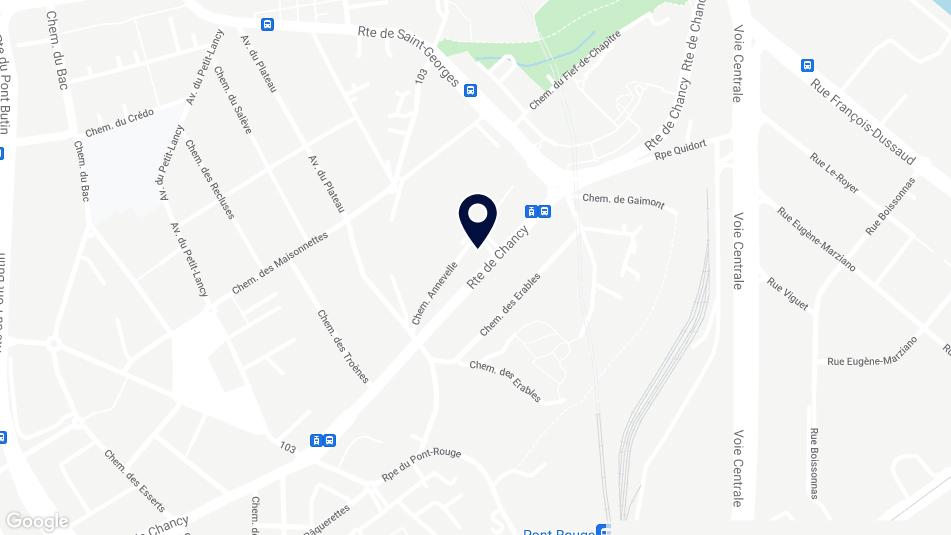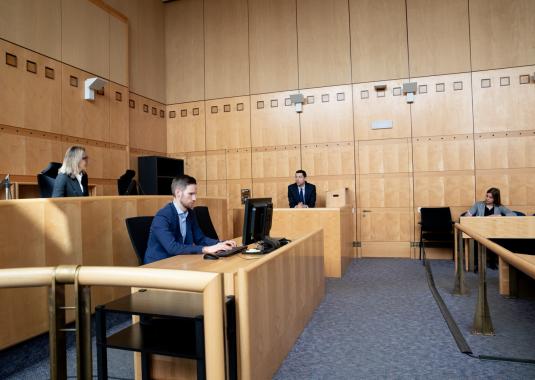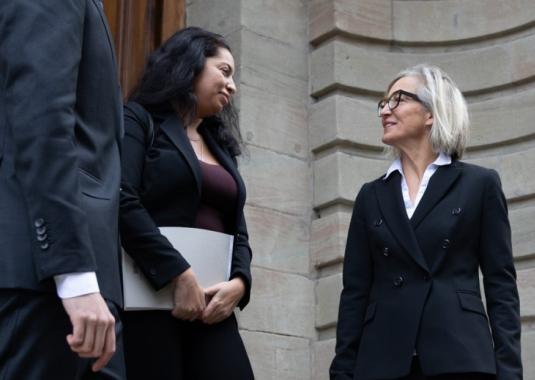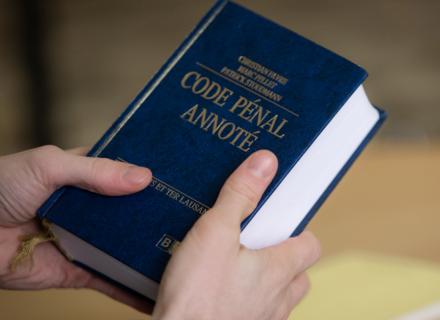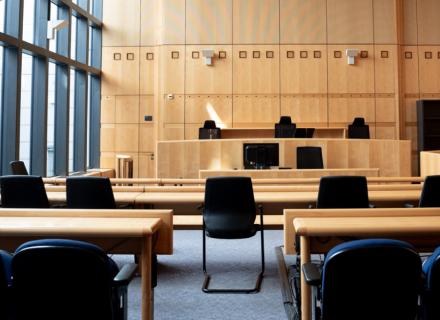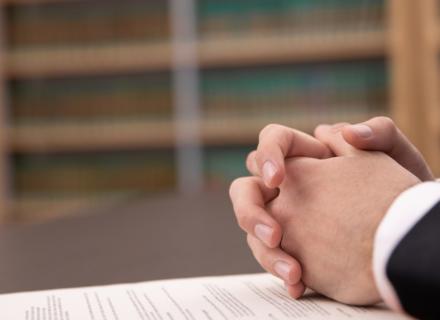Contacts
Address
Contact details
Desk
Opening hours
8h-12h / 14h-17h
Mailing address
Ministère public
Case postale 3565
1211 Genève 3
Presidency and Jurisdiction Directorate
-

Mr. Olivier JORNOT
Attorney General
-

Mrs Sylvie ARNOLD
Director
Competences
The Public Prosecutor's Office receives complaints, denunciations and police reports. It decides whether to prosecute acts that may constitute criminal offences.
It conducts the preliminary proceedings by instructing the police to investigate and conducts the investigation to establish the facts by collecting evidence.
It may take various decisions (open an investigation, issue an order not to proceed with a case, condemn by a summary penalty order, order the case to be closed, refer the case to a trial court by an indictment).
It supports the prosecutor's case before the trial and appeal courts.
It exercises the competences of the juvenile prosecutor by supporting the accusation, as well as by participating in the debates before the Tribunal des mineurs and, where appropriate, before the court of appeal.
It is competent in matters of domestic and international mutual assistance.
It refers to the enforcement procedures of sentences and measures to the Tribunal d'application des peines et des mesures, in particular with regard to parole.
It executes the decisions of all criminal law jurisdictions, except in matters of detention and recovery.
Organization
The functions of the Public Prosecutor's Office are carried out by the Attorney General, who directs and organizes the jurisdiction, with the help of 5 chief public prosecutors and 43 public prosecutors divided into 4 sections, one of which is in charge of complex cases of economic or criminal nature.
Each chief public prosecutor is responsible of one section, with the exception of the chief public prosecutors in charge of assisting the Attorney General in the handling of presidential affairs.
- Attorney General: Olivier JORNOT
- Chief public prosecutors: Adrian HOLLOWAYI (presidential cases), Elsa STUDER (section 1), Anne-Laure HUBER (section 2), Olivier LUTZ (section 3), Yves BERTOSSA (section 4)
Instructions
Application forms
Criminal legal aid
In criminal proceedings.
Attestation
Le formulaire de délivrance d’attestation permet aux justiciables ou avocates et avocats d’obtenir une attestation d’entrée en force d’une ordonnance pénale.
Ce formulaire, dûment complété et accompagné des pièces justificatives requises, peut être remis au greffe du Ministère public, envoyé par pli postal ou transmis par courriel avec signature électronique sur le formulaire au moyen d'une plateforme sécurisée reconnue.
La délivrance de l’attestation est soumise au paiement préalable d’un émolument de CHF 50.-. Les justiciables au bénéfice de l'assistance judiciaire en qualité de partie plaignante sont dispensées du paiement de l'émolument.
Inspection of case documents/photocopy
Recovery of objects/assets Recovery
Inmate visit
- Demande d’autorisation de visite d'une détenue ou d'un détenu (français)
- Demande d’autorisation de visite d'une détenue ou d'un détenu (allemand)
- Demande d’autorisation de visite d'une détenue ou d'un détenu (italien)
- Demande d’autorisation de visite d'une détenue ou d'un détenu (espagnol)
- Demande d’autorisation de visite d'une détenue ou d'un détenu (albanais)
Questions/answers
The Public Prosecutor's Office can be contacted in various ways:
- In writing or by telephone
- By eFax, after having previously taken note of the rules of use
- In person, by going to the desk
You can go to a police station. A police officer will draw up a record of your statements.
You can also write directly or drop off your letter at the Public Prosecutor's Office. Your complaint must be signed and must describe the facts clearly and completely, with all the important elements (including date and place of the facts, context, names of the persons involved, possible witnesses, medical certificates, etc.). The legal qualification of the facts is not necessary, but it can be mentioned.
Your complaint must be filed within 3 months.
You cannot obtain information by telephone for reasons of confidentiality. You must make a request in writing to the Public Prosecutor's Office.
Each summary penalty order mentions the steps to be taken to file an objection. You must write a letter within 10 days stating that you are contesting the decision received.
The objection must be submitted no later than the last day of the deadline to the Public Prosecutor's Office, the Swiss Post Office, a Swiss consular or diplomatic representation, or, in the case of detained persons, the Directorate of the prison establishment (art. 91 CrimPC).
You will automatically receive a payment slip from the Contraventions Service once the summary penalty order is enforceable.
If you have any questions about payment arrangements, you should contact the Contraventions Service.
To obtain an adjustment of the terms of payment (extension of the deadline, payment by instalments), you are invited to go personally to the Contraventions Service with the payment slip you received, your last tax notice, your last salary slip and any supporting documents for your income and expenses.
You should fill in the form Request for the return of the seized objects and send it, signed, to the Public Prosecutor's Office. You must then wait for the Public Prosecutor's Office to inform you of its decision.
If the summary penalty order commands the return of the seized property, you may, once the order has come into force, collect the property by making an appointment with the Greffe des pièces à conviction.
If the summary penalty order commands the restitution of the assets that have been seized, you can request, once the order has come into force, the restitution of the seized assets from the financial services of the Judiciary Power, by enclosing a copy of the order, your bank or postal details and a copy of your identity document.
If you have any questions regarding the restitution procedure, please contact the financial services of the Judiciary Power.
You should fill in the form Request for authorisation to visit, sign it and send it to the Public Prosecutor's Office by post or as an attachment to an e-mail, enclosing a copy of your identity document.
After waiting at least 2 days, you can contact the registry of Champ-Dollon's prison to know the decision of the public prosecutor. If the visit is granted, you will be able to make an appointment directly with the prison.
It is not possible to request an individual interview with a public prosecutor. Public prosecutors receive only the persons they have summoned.
For confidentiality reasons, no information is given by the Public Prosecutor's Office on this subject.
You should fill in the form Request of photocopies and then return it signed to the Public Prosecutor's Office. You must then wait for the Public Prosecutor's Office to inform you about its decision.
The copies requested are charged at the tariffs in accordance to the Instruction C5.
You should fill in the form Request for inspection and then return it signed to the Public Prosecutor's Office. You must then wait for the Public Prosecutor's Office to inform you of its decision.
Hearings at the Public Prosecutor's Office are not public (art. 69 para.3 let.d CrimPC). Only the person summoned and his/her legal agent will be admitted to the hearing.
Victims whose physical, sexual or mental integrity has been directly and adversely affected by the offence may be accompanied by a confidant (art. 116 and 117 para. 1 let.b CrimPC, victims assistance Act (LAVI - RS 312.5)).
No, you cannot accompany a relative. However, anyone summoned to a hearing may request an official interpreter (art. 68 CrimPC).
The request must be made by telephone, no later than 24 hours before the date of the hearing, to the Public Prosecutor's Office.
You must come to the hearing to which you are summoned.
If you are unable to attend for a valid reason, you must immediately inform the Public Prosecutor's Office and present the documents justifying your impediment (medical certificate, plane tickets, etc.). Unless otherwise advised by the Public Prosecutor's Office, the hearing is maintained and your presence is compulsory.
A selection of addresses is proposed in the page Legal advice service and legal counsels.
You should fill in the form Personal situation for the appointment of a duty defence lawyer (for the accused) or Personal situation for granting judicial aid (for the private claimant or another participant), sign it, attach the documents concerning your personal situation and send it to the Public Prosecutor's Office by mail and eFax.
The public prosecutor in charge of the proceedings will send you his/her decision in writing.
The Public Prosecutor's Office does not provide any legal information. A selection of addresses can be found in the page Legal advice service and legal counsels.
Questions relating to residence permits should be addressed to the Cantonal Office for Population and Migration (OCPM).
Enquiries relating to the register of convictions should be addressed to the Federal Office of Justice.
Lawyers wishing to be included in the duty defence lawyers’ list of the Public Prosecutor's Office may fill in the Form for duty defence lawyer appointments at the Public Prosecutor's Office made available on the website of the Geneva Bar Association and send it, by e-mail.
Lawyers who no longer wish to appear on the duty defence lawyers’ list of the Public Prosecutor's Office are invited to communicate their wish, by postal mail to the Public Prosecutor's Office.
You can contact LAVI Center (assistance to victims of crime in Geneva).
